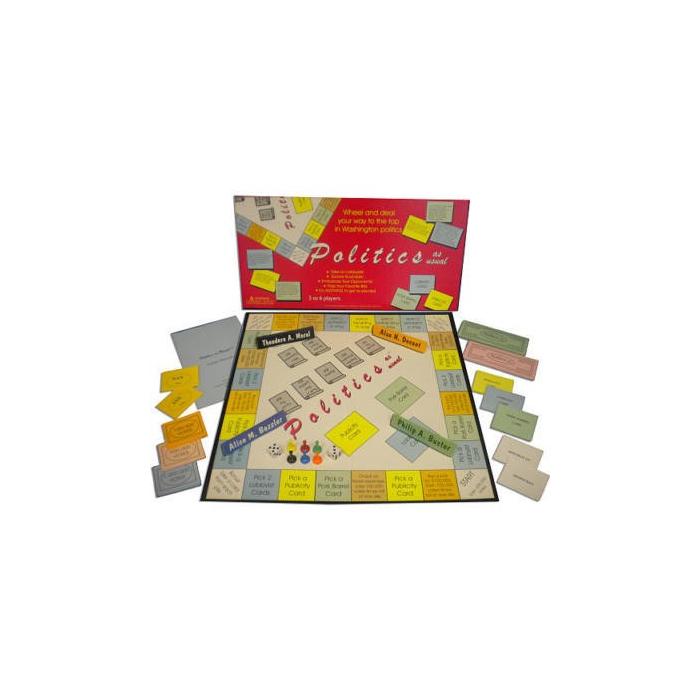Franklin Learning Systems
Politics As Usual
$56.95 inc GST $51.77 ex GST
Politics As Usual is a game about the workings of the U.S. Senate and government in general. It is a cross between a simulation and a parody. It is deliberately designed to be funny, yet at the same time, the play of the game reflects the true realities of the American political process. It is especially relevant because of its focus on campaign fund raising and the influence of lobbyists. In social studies and government courses, students learn how the government is supposed to work. Textbooks tend to mention major scandals, such as Watergate, but don’t focus on how the workings of the government fail to live up to the vision of the Founding Fathers on a day-to-day basis.
In Politics as Usual, students learn how the legislative process in real life can vary from the textbook ideal. Students are introduced to the influence of lobbyists, pork barrel legislation, and the wheeling and dealing that is normal in Washington politics. In other words, Politics as Usual teaches about the imperfections in the system. Politics as Usual is a competitive game, and the players are motivated to win. The game is structured so that in order to win (get votes in the game) players are motivated to listen to the advice of lobbyists, pass money-wasting pork barrel legislation, etc. Players are also motivated to trade promises, votes on various pieces of legislation, etc. In the game the players themselves exploit the very same imperfections in the political system that they would ordinarily deplore. In fact, the game gives important lessons on character as well as government. The post game discussion is lively, and players analyse the political process in the light of their own behaviour as U.S. Senators in the game. Students have a great time AND learn some important things about government.
Players: 3-6 players (more with team play)
Grades: 7 – 12
Product overview
Politics As Usual is a game about the workings of the U.S. Senate and government in general. It is a cross between a simulation and a parody. It is deliberately designed to be funny, yet at the same time, the play of the game reflects the true realities of the American political process. It is especially relevant because of its focus on campaign fund raising and the influence of lobbyists. In social studies and government courses, students learn how the government is supposed to work. Textbooks tend to mention major scandals, such as Watergate, but don’t focus on how the workings of the government fail to live up to the vision of the Founding Fathers on a day-to-day basis.
In Politics as Usual, students learn how the legislative process in real life can vary from the textbook ideal. Students are introduced to the influence of lobbyists, pork barrel legislation, and the wheeling and dealing that is normal in Washington politics. In other words, Politics as Usual teaches about the imperfections in the system. Politics as Usual is a competitive game, and the players are motivated to win. The game is structured so that in order to win (get votes in the game) players are motivated to listen to the advice of lobbyists, pass money-wasting pork barrel legislation, etc. Players are also motivated to trade promises, votes on various pieces of legislation, etc. In the game the players themselves exploit the very same imperfections in the political system that they would ordinarily deplore. In fact, the game gives important lessons on character as well as government. The post game discussion is lively, and players analyse the political process in the light of their own behaviour as U.S. Senators in the game. Students have a great time AND learn some important things about government.
Players: 3-6 players (more with team play)
Grades: 7 – 12
Learning Objectives:
- Develop an understanding of many of the political realities of our system of government, including the role of lobbyists, pork barrel legislation, etc.
- Learn how Senators and other elected officials are motivated to “wheel and deal” in order to get their favourite legislation passed and get re-elected.
- Learn important communication, negotiating, and other interpersonal skills.
- Learn to think critically about the way systems are designed to work and how they work in practice.










